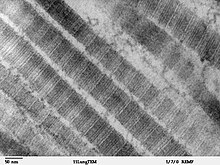Acrogeria (Gottron's syndrome) is a skin condition characterized by premature aging, typically in the form of unusually fragile, thin skin on the hands and feet (distal extremities).[1]
| Acrogeria | |
|---|---|
| Other names | Acrogeria, Gottron type, Gottron's syndrome[1] |
 | |
| Fibers of Collagen Type I - TEM | |
| Specialty | Dermatology |
This is one of the classic congenital premature aging syndromes, occurring early in life, others being pangeria (Werner's syndrome) and progeria (Hutchinson–Gilford's syndrome), and was characterized in 1940.[2] Acrogeria was originally described by Gottron in 1941, when he noticed premature cutaneous aging localized on the hands and feet in two brothers. The problem had been present since birth.[2]
Onset is often in early childhood, it progresses over the next few years and then remains stable over time with morphology, colour and site remaining constant. A bruising tendency has been observed.[3] Mutations in the COL3A1 gene, located at chromosome 2q31–q32, have been reported in varied phenotypes, including acrogeria and vascular rupture in Ehlers-Danlos' syndrome (more especially type IV).[4]
See also
editReferences
edit- ^ a b Rapini, Ronald P.; Bolognia, Jean L.; Jorizzo, Joseph L. (2007). Dermatology: 2-Volume Set. St. Louis: Mosby. ISBN 978-1-4160-2999-1.
- ^ a b Gottron, H. Familiaere Akrogerie. Arch. Derm. Syph. 181: 571-583, 1940.
- ^ Blaszczyk M, Depaepe A, Nuytinck L, Glinska-Ferenz M, Jablonska S (2000). "Acrogeria of the Gottron type in a mother and son". Eur J Dermatol. 10 (1): 36–40. PMID 10694296.
- ^ Pope FM, Narcisi P, Nicholls AC, et al. (1996). "COL3A1 mutations cause variable clinical phenotypes including acrogeria and vascular rupture". Br J Dermatol. 135 (2): 163–181. doi:10.1046/j.1365-2133.1996.d01-971.x. PMID 8881656.